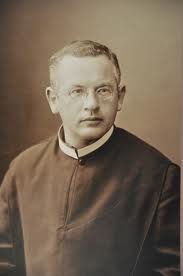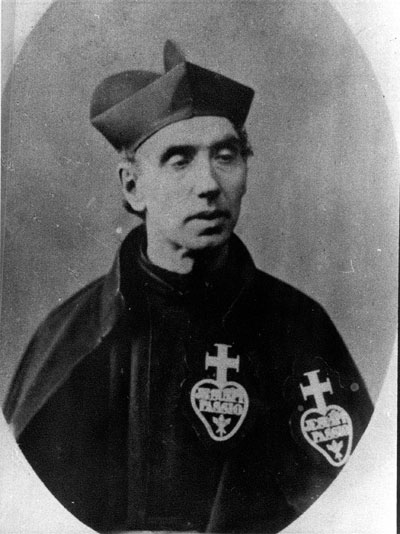There is a saying that those who wed themselves to the spirit of the age are quickly widowed, and how true it is. It seems that as I write there are many who are entering the state of widowhood, among them many priests, religious, and even bishops. One of our bishops who is determined to remain wedded to Christ is Cardinal Christoph Schoenborn. In a recent interview he has responded publicly to the revolt of some of his priests who want a “reform” of the Church, reform being, in their lexicon, an abandonment of fundamental Church teachings and practices in order to embrace the spirit of our secularist age. As the Cardinal rightly points out if he were to do this he would break communion with the Church and he is not prepared to do that.
This raises an interesting question – right back at them: have they broken communion with the Church (though they insist “We are the Church”)? Indeed is it not time for them to reconsider their position and make formal what they are already informally? May it not be time for those who will not accept the teaching of the Catholic Church to consider a denomination which holds as its teachings what they already believe themselves? St Dominic Savio’s famous motto, “be true to yourself”, may be the one they need to adopt for themselves.
We often hear the word “reform” bandied about by those who, in reality, do not want to bring us back to the purity of Christ’s message, but rather a new secularised version which in reality detracts from what the Lord intended to do. The canon of dissident is normally made up of sexual issues proving time and time again that care of the human spirit tends to come second to the desires of the body. Instead of trying to embrace a life of balance and chastity, following the example of Christ, our erstwhile “reformers” want to tinker at Christ’s teaching in order to facilitate sexual desire, not in a healthy sense, but in a permissive sense. Jesus never said “anything goes as long as you love each other”, but our modern thinkers relying on the broadest, most relativist interpretation of the one piece of Christian teaching they accept, “God is love”, have managed to crowd in everything and anything so they can justify any aberration.
They say the Church is obsessed with sex – not so, they only think that because they are the ones obsessed with sex. If you listen to these reformers when in one of their attacks on the Church you do not have to wait very long before sex pops up in the debate as they decry the Church’s ban on contraception, pre-marital sex, divorce and remarriage and now, homosexuality.
Even the debate on married priests is not too far away from sex. A friend of mine, who has had more than his fair share of debates with these reformers, has come to conclusion that the debate about married priests is about sex: “They just want the priest to be having sex so then he is no different from anyone else”. After much thought I think his conclusion is correct. Celibacy serves as a sign in the modern world to another life, a life of purity and grace. Celibacy teaches all of us that sex is not the be all and end all of life: it is one part of life, but not all of life – there is more to the human person than sex. That contradicts the ideological thinking of many, those who see untrammelled sex as the great sign of liberation and freedom – the triumph of “MY will” over the world. Ultimately it is another expression, the most powerful expression today, of the non serviam.
This is why Bishop Edward Daly, with all due respects to him, is wrong: celibacy is important because it reminds the world that the priest is a man set apart. While he has the same difficulties and temptations as everyone else – sometimes more, he must strive to become what he has promised to be – his promise of celibacy is the potent sign of this. A priest is not to be like other men, he is different. A priest is not his own, as Archbishop Fulton Sheen reminds us, he belongs to God and the Church – so he must never belong to another human being exclusively be it a wife or children.
Some will say the celibacy rule is already undermined by former Anglicans who are ordained or Eastern Rite priests, but these exceptions do not undermine the rule, but rather draw our attention to it. These priests do great work, but their first responsibility is to their wives and families, as it should be: the Church, though, needs men whose first responsibility is to a lifetime’s service of the Church: men who even in their own bodies, conform themselves to Christ the High Priest whose bride and only spouse, is the Church. Call that idealistic, unrealistic, unworkable if you want, but when the critics of celibacy roll out the hard cases to prove their point, the Church can point to millions of celibate, holy and happy priests who devoted their entire lives to the selfless service of the people of God, to prove her point.
It has also been said that the rule of celibacy is preventing many young men from considering the priesthood, and so the Church is being deprived of their ministry. I disagree with that: if a young man is deterred from priesthood because of celibacy, then priesthood is not for him: it is a life which requires a radical dying to self and so when a man is considering priesthood he has to be prepared to let everything else go. Those priests who are struggling with celibacy are struggling with living their vocation, as all who have embraced a vocation struggle. Married couples struggle and their struggle can be, at times, worse than that of a priest.
It is said that the loneliness is too much for a man, he needs a life’s companion. There are many who live alone and who must deal with loneliness – that single life is not always chosen. There are people in marriage who are lonely. A priest must order his life and his day so as to deal with that loneliness. As for a life companion – the priest should already have one – Christ. A priest must pray: in prayer he will come to know and love his Lord as his spouse. Unfortunately some priests put prayer way down the agenda – they are too many other things to do: but prayer must be a priority. A psychologist priest I know, who has decades of experience of working with priests in crisis, once said to me that when a priest comes to him with a vocational crisis and is thinking of leaving, the first question he asks is: “When did you stop praying?” Inevitably, he says, prayer has been absent or scarce for many in this situation.
It has been said that a priest should have a family to call his own: he does – it’s called the Church. One of the joys of priesthood is that you are a member of many families, all of whom take you to their hearts and love you. Whenever I go out on visitation I am welcomed by my parishioners and others, and they take you right into their homes and their lives. They trust you, confide in you, love you, because you are their priest – the one who has chosen to offer his life in service for them and is there for them whenever they need him. That is the way it should be. A priest has many children whom he must love and care for – when a priest is struggling with celibacy, he should also remember his people who love him for the sacrifice he has made for them.
I have had many debates on this issue, and this stage I remind the critics of the above and then turn to the pragmatic argument: are they prepared to up the offerings in order to provide their priest with an income to support his wife and many children (after all, we’ll be good Catholics, there will be no contraception!)? When I list out the amount necessary and then the fact that he will not be as free for them as he was when celibate, they go strangely quiet. The theoretical argument has set them on fire, but when reality hits and it means digging deeper into their pockets, funnily, things don’t seem as simple then.













